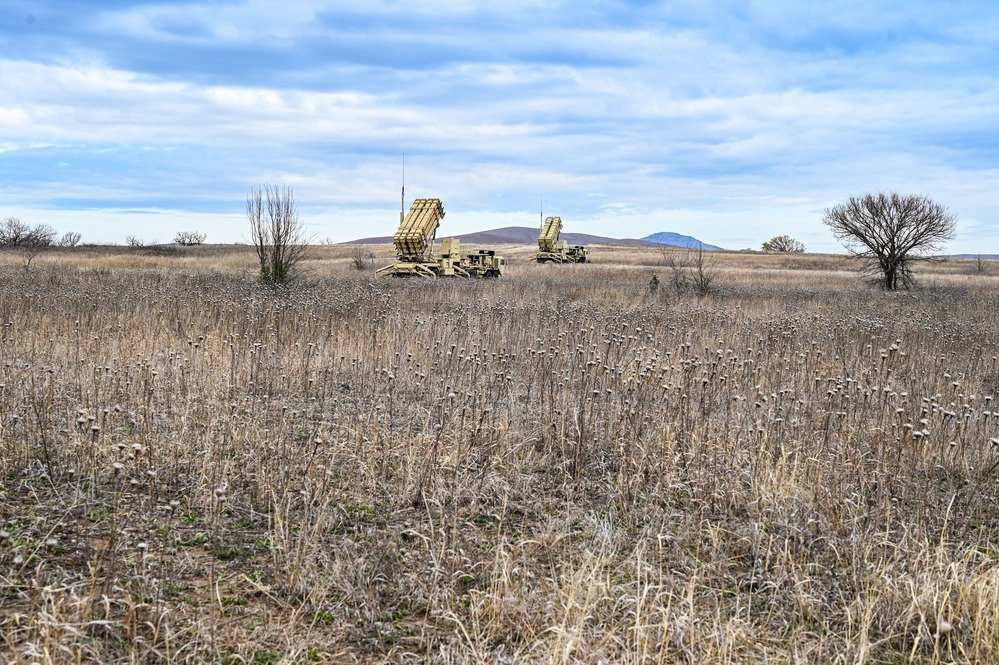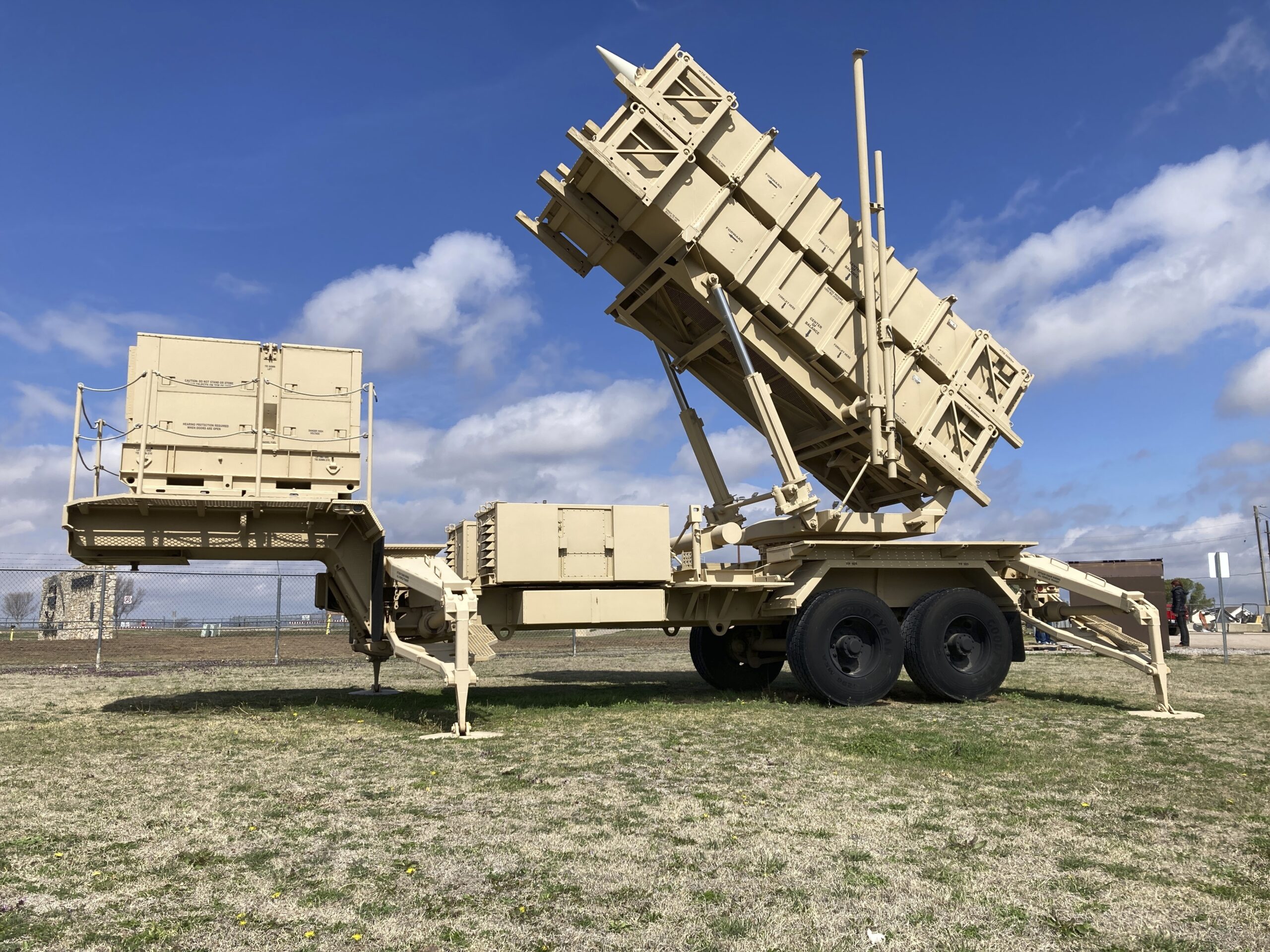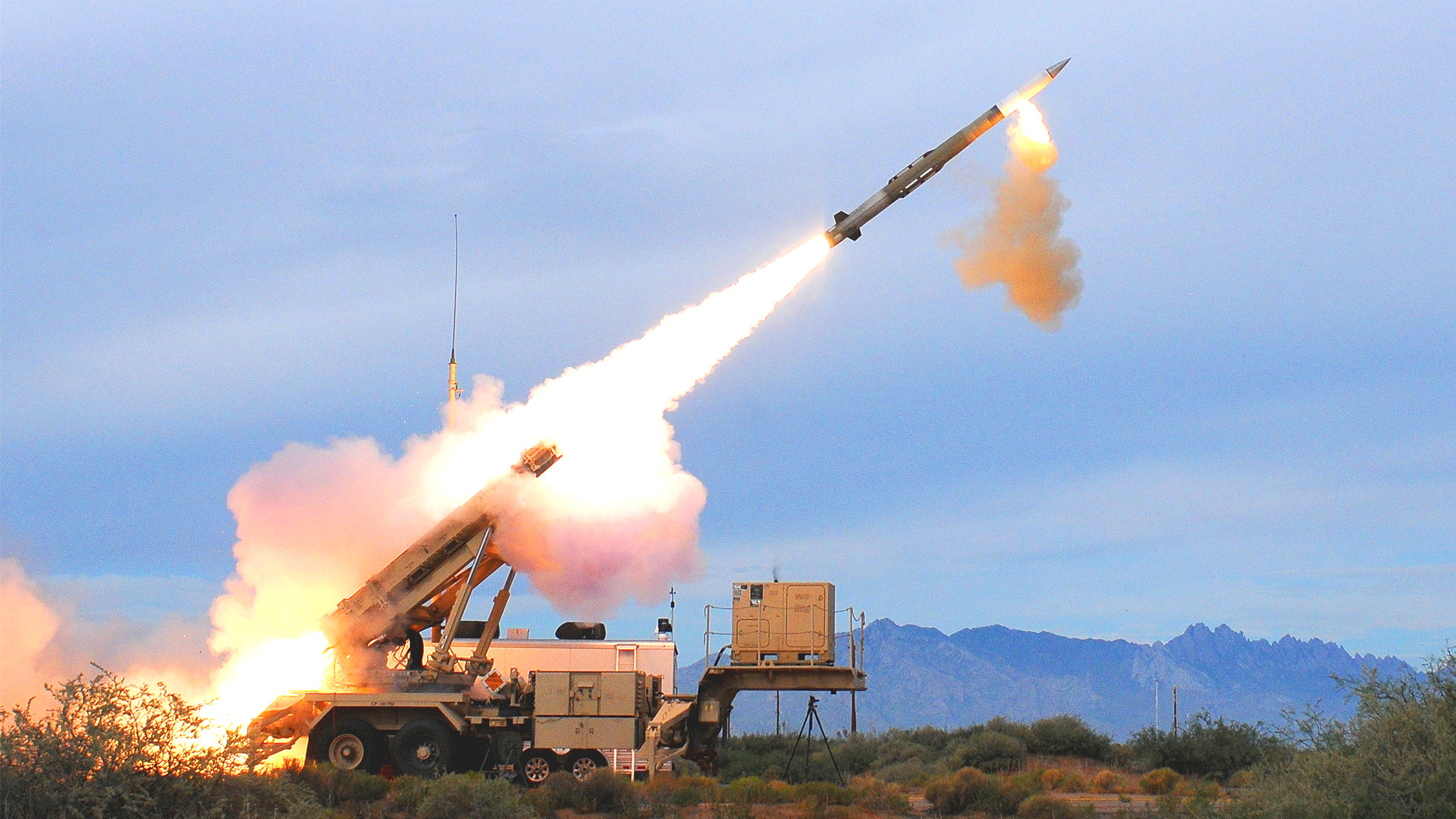Ukraine is one step closer to having at least some parts of its skies protected by Patriot air defense systems.
After a little more than three months, the first cadre of 65 Ukrainian air defense troops arrived back in Europe this week after training on Patriot air defense systems at Fort Sill, Oklahoma, according to the Pentagon. Those troops began training on Jan. 15.

“They’re integrating with other Ukrainian Air defenders along with donated Patriot air defense equipment from the United States, Germany and the Netherlands,” Air Force Brig. Gen. Pat Ryder, the Pentagon’s top spokesman, told reporters Thursday. “Once in Ukraine, the Patriot air defense system will add to Ukraine’s layered air defenses to provide protection and shield from Russia’s wanton, brutal attacks on innocent civilians and civilian infrastructure.”
The training at Fort Sill went “faster than expected,” Ryder told reporters earlier this month.
Those troops will then move on to Europe for additional training on the two Patriot systems – one American and one donated by the Germans and Dutch – that will be deployed to Ukraine in the coming weeks, U.S. defense officials told reporters at Fort Sill last week.
Germany had initially promised Ukraine a Patriot system, but both CNN and Politico reported Tuesday that it will consist of components from German and Dutch systems.
Ryder didn’t offer any timeline on when the U.S.-promised MIM-104 Patriot air defense system will arrive in Ukraine.
Earlier this month, he told reporters at the Pentagon that delivery of the Patriot battery will be “expedited.”
But he did not offer specifics.
“So for operations security reasons, I’m not going to get into delivery timelines other than to say we’re confident that we’ll be able to get the Patriots there on an expedited timeline,” Ryder said. “I’ll just leave it at that.”

During an interview published by The Associated Press on Wednesday, Ukrainian President Volodymyr Zelensky said none of the promised systems have yet been delivered.
“We have great decisions about Patriots, but we don’t have them for real,” he told AP.
Ukraine needs 20 Patriot batteries to protect against Russian missiles, and even that may not be enough “as no country in the world was attacked with so many ballistic rockets,” he said.
Zelenskyy added that a European nation sent another air defense system to Ukraine, but it didn’t work and they “had to change it again and again.” He did not name the country.

Though Patriots are “capable of intercepting cruise missiles, ballistic missiles and aircraft, it’s important to put the Patriot battery in context,” a senior U.S. defense official told reporters, including from The War Zone on Dec. 21, the day Zelensky was in Washington D.C. to hear from U.S. President Joe Biden that the Patriots were officially promised to Ukraine.
“For air defense, there is no silver bullet. Our goal is to help Ukraine strengthen a layered integrated approach to air defense that will include Ukraine’s own legacy capabilities as well as NATO standard systems. Patriot will complement a range of medium- and short-range air defense capabilities that we have provided and the allies have provided in prior donation packages.”
In addition to the Patriot training, more than 7,000 Ukrainian troops have been trained by U.S. European Command, U.S. Army Europe and the Security Assistance Group Ukraine since Russia launched its all-out war, Ryder said.
By the end of this month, Ryder added, more than 4,000 Ukrainian troops who have been training in two brigades – one on Bradley Fighting Vehicles, the other on Stryker armored vehicles – will have returned to Ukraine after completing combined arms training in Germany.
Additional combined arms training is currently underway at the Grafenwoehr and Hohenfels training areas in Germany, with two motorized infantry battalions consisting of 1,200 Ukrainian Armed Forces personnel, said Ryder.
Operator and maintenance training on donated platforms is also ongoing, he said, “with more than 3,000 Ukrainian soldiers having completed platform training in 40 different programs of instruction on more than 20 systems since April of 2022.”
Training for Ukrainian forces “is an international effort being conducted in partnership with our coalition partners, who are currently training another 11,000 Ukrainian soldiers across 26 different nations,” Ryder said.
Though the training was designed to help Ukrainians become proficient at combined arms maneuvers, Ryder declined to say whether it is geared toward a looming Ukrainian counteroffensive.
“I’m not going to talk about potential future operations,” he said. “I’m not gonna talk about timelines.”
Before we dive into the latest updates from Ukraine, The War Zone readers can get caught up on our previous rolling coverage here.
The Latest
As the two sides continue to slug it out in and around Bakhmut, Ukrainian Foreign Minister Dmytro Kuleba downplayed the ultimate significance of the looming spring counteroffensive.
Kuleba told FT that the narrative about the counteroffensive being a make-or-break moment was dangerous for Ukraine because if it faltered it would strengthen those in the west who want to push Kyiv into a compromise with Moscow.
“We should counter by all means the perception of the counter-offensive as the decisive battle of the war,” he told FT.
All wars are a series of battles, he added, and if this offensive is seen as critical but does not result in the “100% liberation of our territory” then “some people may say this was the last decisive battle and now we have to think of an alternative scenario.”
Meanwhile, the fight in Bakhmut remains fierce, as you can see from this Ukrainian T-64BV tank that was destroyed by Russian forces there.
As Russia seeks more weapons and ammunition to fuel its all-out war in Ukraine, the U.S. has sanctioned a Slovakian arms merchant for working with North Korea (the Democratic People’s Republic of Korea, or DPRK) to send arms to Moscow in exchange for food and other goods.
“Today, the United States is designating Ashot Mkrtychev for arms-related activities involving the DPRK and Russia,” U.S. Secretary of State Antony Blinken said in a statement Thursday. “This is the first designation in the DPRK sanctions program in response to Russia’s attempt to secure weapons from the DPRK.”
The actions against Mkrtychev come as Russia is consuming some 400,000 rounds of artillery ammunition per month, according to Ukrainian officials, and has lost a tremendous amount of equipment.
“Russia has lost over 9,000 pieces of heavy military equipment since the start of the war, and thanks in part to multilateral sanctions and export controls, Putin has become increasingly desperate to replace them,” Treasury Secretary Janet L. Yellen said in a statement. “Schemes like the arms deal pursued by this individual show that Putin is turning to suppliers of last resort like Iran and the DPRK. We remain committed to degrading Russia’s military-industrial capabilities, as well as exposing and countering Russian attempts to evade sanctions and obtain military equipment from the DPRK or any other state that is prepared to support its war in Ukraine.”
Between the end of 2022 and early 2023, Mkrtychev “worked with DPRK officials in an attempt to obtain more than two dozen different kinds of weapons and munitions for Russia in exchange for materials ranging from commercial aircraft to raw materials and commodities to be sent to the DPRK,” said Blinken. “He also confirmed Russia’s readiness to receive military equipment from the DPRK with senior Russian officials.”
Mkrtychev’s negotiations with those officials “indicated that necessary Russian preparations for a proposed deal were complete and that they were ready to receive materials from and transfer materials to the DPRK,” the U.S. Treasury Department said in a statement.
Mkrtychev also provided DPRK officials with information from Russian officials, “likely connected to his attempts to obtain military equipment for Russia from DPRK,” according to the Treasury Department.
He also worked with a Russian individual “to locate commercial aircraft suitable for delivery to the DPRK.”
As a result, the Treasury’s Office of Foreign Assets Control (OFAC) sanctioned Mkrtychev.
“Effective today. he’s cut off from the U.S. financial system and he will face significant challenges in attempting to access and abuse, the international financial system,” White House National Security Council spokesman John Kirby told reporters, including from The War Zone, Thursday.
There is no apparent connection between Mkrtychev and previous shipments of munitions by North Korea to Russia, Kirby said.
China said its military was willing to work together with the Russian military to strengthen strategic communication and coordination, the Chinese defense ministry said on Thursday, according to Reuters.
Moscow and Beijing would work together to implement global security initiatives, said Tan Kefei, a spokesman at the Chinese defense ministry, at a regular press conference.
China and Russia would deepen military trust and jointly safeguard international fairness and justice, Tan said.
Those comments come a day after U.S. Defense Secretary Lloyd Austin told the House Armed Services Committee that he didn’t believe China was ready to provide “material support” to Russia for its fight against Ukraine.
Chinese President Xi Jinping “feels that as long as there’s a Russia that can keep NATO and the U.S. busy, then that works in his favor and keeps us from focusing on the Indo-Pacific,” Austin testified. “I don’t think that he has agreed to provide material support to Russia at this point.”
Military activity is increasing around the Zaporizhzhia nuclear-power plant, according to international atomic energy officials, as Ukrainian and Russian forces gear up for an expected increase in fighting this spring, The Wall Street Journal reported.
“The situation is not improving—it is obvious that military activity is increasing in this whole region,” Rafael Grossi, director-general of the International Atomic Energy Agency, said Wednesday after a visit to the plant. “There’s a significant increase in the number of troops in the region and there is open talk about offensives, counteroffensives and so on.”
The United States and 44 other countries on Thursday asked the Organization of Security and Cooperation in Europe’s (OSCE) Office of Democratic Institutions and Human Rights (ODIHR) to establish “an expert mission to examine allegations of the forced transfer of children in those parts of Ukraine’s territory temporarily controlled or occupied by Russia, as well as allegations that Ukraine’s children have been deported to the Russian Federation,” the U.S. State Department announced Thursday.
“This expert mission will look into whether such actions and any abuses associated with or resulting from them violate international law, constitute war crimes or crimes against humanity, and/or contravene relevant OSCE commitments,” according to a State Department media release. “This mission will also be tasked with collecting, consolidating, and analyzing any evidence that could be shared with relevant accountability mechanisms as well as national, regional, or international courts or tribunals that may have jurisdiction.”
OSCE’s April and July 2022 Moscow Mechanism Mission Reports investigations “documented widespread human rights abuses and violations of international humanitarian law by Russian Federation forces in Ukraine,” according to the State Department. “Those reports cataloged extensive evidence of direct targeting of civilians, attacks on medical facilities, rape, torture, summary executions, looting, and forced deportation of civilians to Russia, including children, constituting ‘clear patterns of serious violations of international humanitarian law attributable mostly to Russia’s armed forces…in the territories under the effective control of the Russian Federation.’”
The move was supported by Ukraine.
“I welcome the appeal of the 45 OSCE participating States to the Moscow Mechanism regarding the resolution of the forced transfer of Ukrainian children to Russia,” said Kuleba. “Decisive joint actions are needed to stop this practice of genocide, return the children to Ukraine and bring the perpetrators to justice.”
Earlier this month, the International Criminal Court (ICC) in The Hague issued an arrest warrant for Russian President Vladimir Putin. The ICC accused Putin of war crimes for the illegal deportation and transfer of Ukrainian children to the Russian Federation. The ICC also issued an arrest warrant for Maria Lvova-Belova, commissioner for Children’s Rights in the Office of the President of the Russian Federation, accusing her of the same war crimes.
You can read more about that in our story here.
The four MiG-29 Fulcrum fighter jets provided by Slovakia to Ukraine are already protecting the skies over Ukraine, according to a member of the Ukrainian Verkhovna Rada parliament.
“On behalf of all Ukrainians whose lives are protected by aviation, I thank you very much,” said Olena Kondratjuková, deputy head of that body, in a speech to the National Council of the Slovak Republic on Wednesday, according to the Slovakian Sita news agency.
Maybe a bridge isn’t a very good place to hide weapons. Former Ukrainian President Petro Poroshenko said on his Telegram channel Thursday that a Ukrainian Poseidon drone spotted a cache of weapons under a bridge in Donetsk and shared the video below.
Here is a close-up look at how Ukrainian border guards load up a large drone with bombs and the resulting attack on Russian troops across the Dnipro River in Kherson Oblast.
Meanwhile, Ukrainian special operations forces were observed working with U.S.-provided Switchblade 300 loitering munitions.
And finally, during this conflict, Ukraine has captured thousands of Russian tanks, armored personnel carriers, and other weapons. The soldiers seen in this video below captured so many weapons they are running out of room to store them.
Looks like they’ll need a bigger trench.
That’s it for now. We’ll update this story when there’s more news to report about Ukraine.
Contact the author: howard@thewarzone.com
